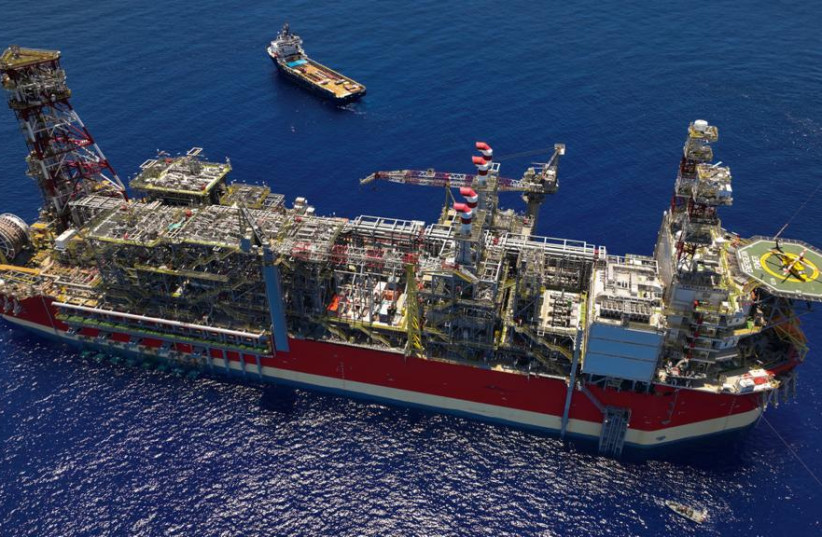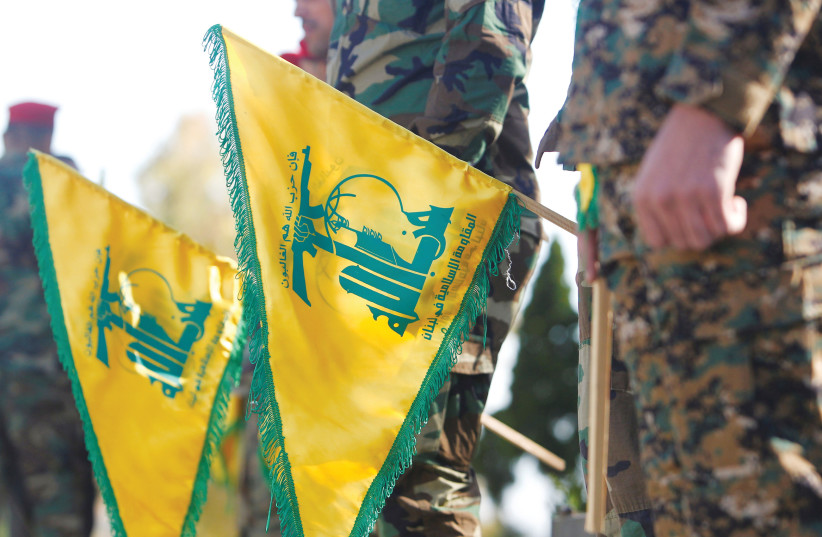The maritime border deal with Lebanon has more than a tinge of irony to it, since it comes from a government that prided itself on stopping former Prime Minister Benjamin Netanyahu’s practice of allowing Qatar to transfer suitcases full of cash to Hamas in Gaza to pay the terrorist group to stop shooting rockets at Israel – for a while at least.
Not only is Prime Minister Yair Lapid’s government going to pay Hezbollah to be quiet, it’s doing so directly – in economic waters as opposed to Qatari cash.
One could argue that Lapid learned that it’s better to pay up and secure Israel’s ability to pump gas from its Karish Reservoir, rather than fight the war that Hezbollah was threatening. When Netanyahu did it, paying terrorists to be quiet was something that members of Lapid’s cabinet – like Alternate Prime Minister Naftali Bennett, Finance Minister Avigdor Liberman and Defense Minister Benny Gantz – likened to “protection” payments to the mafia. But hey, people can change their minds, right?
Or, one could point out that this looks like giving in to threats from an Iran-backed terrorist organization that, even after the agreement with Lebanon, still retains 150,000 missiles for the express purpose of attacking Israel.
There are several indications that this agreement came about because of Hezbollah threats.

When Lapid started saying last week that securing 100% of Karish is an achievement of the deal, many eyebrows were raised in response. Hadn’t he insisted that Karish was not up for negotiation in these talks?
Lapid insisted Karish was not up for negotiations
Lebanon presented a new map during negotiations in late 2020, where it claimed that Karish was in its territory. However, it never submitted that new map to the UN, in which the southern maritime border was known as “line 29.” Israel refused to negotiate on that line and the US refused to conduct negotiations based on it rather than on line 23, which is what Lebanon submitted to the UN nearly a decade earlier. In other words: Lebanon floated the idea but never claimed Karish as its own in any official capacity.
When Energean, which holds the license to develop Karish, set up a rig 70 km from Haifa's shores several months ago, Hezbollah said the gas field belonged to Lebanon and increased its threats to Israel, sending drones towards the rig, which Israel shot down. That did not change Lebanon's position on Karish in the talks - but it did change the urgency with which they were treated.
The only achievement that the government can claim pertaining to Karish is silencing Hezbollah's threats to the gas field just as Energean started testing its pipeline.
And that, like any move to appease a terrorist group, likely comes with an expiration date. Payoffs are no guarantee of long-term quiet from Hezbollah; Hamas attacked Israel periodically over the years despite the cash influx from Doha.
Meanwhile, the claim that the deal will stabilize Lebanon and weaken the hold of its sponsor, Iran, on Israel’s northern neighbor is questionable.
The theory frequently raised by Israel’s security establishment when it comes to the Palestinians, that if you give them something to lose, they will behave more peacefully to protect it, has had mixed results.
In this case, specifically, Lebanon and Hezbollah are so completely intertwined that anything theoretically benefitting Lebanon will benefit Hezbollah. The terrorist organization is a party in the Lebanese government. It controls the banks in Lebanon.
And perhaps the most blatant red flag - though it was not a surprise - is that Hezbollah greenlit the deal before Lebanon announced that it is officially accepting it.
On the positive side, Lebanon can protest that it’s not recognizing Israel all it wants, insisting on indirect negotiations and that the agreement should be with Washington and not Jerusalem. Everyone can see through their game, and this is a form of cooperation with Israel, even if it’s not formalized on paper. That goes against everything Hezbollah stands for, so the fact that the other elements in the government managed to get the terrorist group on board is, at least in that way, a plus.
Some of Lapid’s top surrogates have scoffed that the deal’s critics don’t know better than Israel’s security establishment.

Of course, we know that the former director-general of the Energy Ministry and chief negotiator Udi Adiri has issues with it, though he’s not part of the defense establishment.
The fact that the deal is being presented as something that the whole defense establishment supports is, frankly, suspicious. Even when it comes to the Iran Deal, against which there is a broad consensus in Israel, the head of IDF intelligence is known to deviate somewhat from the position held by the rest of the top security echelons, in that he thinks that a weak deal that only buys time until Iran gets a nuclear weapon is a lesser evil than no deal. If no one in the room has any quibbles with this Lebanon deal, then there should be concerns about groupthink; it’s not something to boast about.
In any case, the security establishment is far from infallible. It has made mistakes in the past.
Whether this will be another one remains to be seen, but in the meantime, Hezbollah likes the idea of being paid to be quiet.
